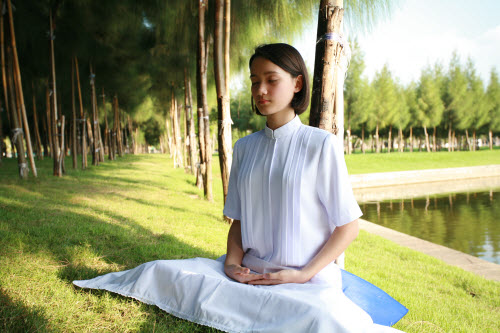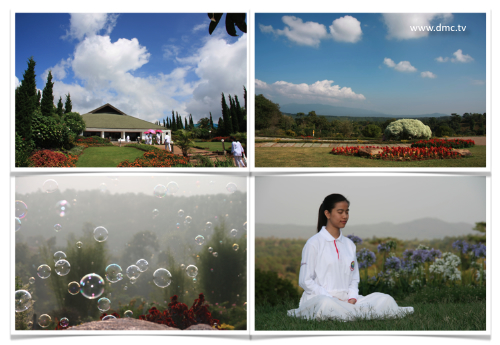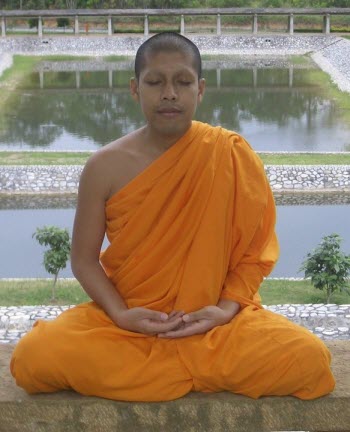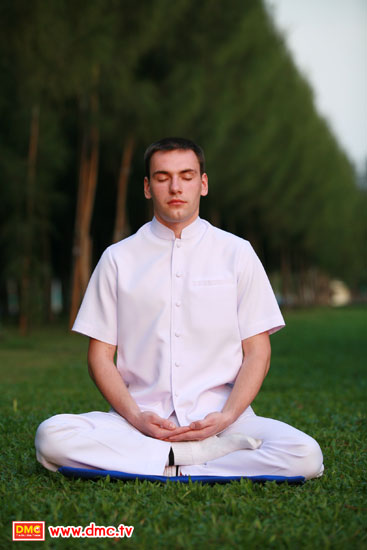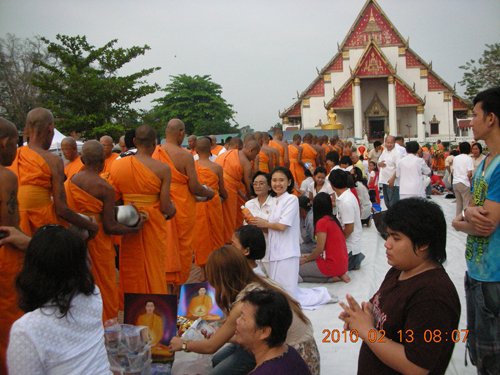Blessing Six:
Setting oneself up properly in life
Setting oneself up properly in life

A. INTRODUCTION
A1. Place of Blessing Six in the order of things
This sixth blessing is the last of the second grouping of blessings concerned with “turning towards virtue”. It builds upon what has gone before with the “nurture” of Blessing Four and the “nature” of Blessing Five — bringing spiritual development to a point where the third grouping “making oneself useful” can start to become meaningful.
A2. Objectives of the Sixth Blessing
Studying this Blessing can be considered to have fulfilled its true purpose if after reading it, the reader feels:
1. inspired to stand on their own two feet: that is, to promise themselves that this lifetime they will never again lower themselves to relying on anyone else as their refuge — no longer using others as crutches for their own weaknesses. The people of old used to say ‘Even a bird builds its own nest — even a mouse digs its own hole — so who is a man not to stand on his own two feet? It is not fitting always to be leaning on others, borrowing from them or living in someone else’s house. Otherwise one is no better than a sparrow living in the rafters of someone else’s house. If you are the sort of person who is not ashamed of being dependent but who is on the other hand proud that there are always others who wants to help them, it will probably be along time before you realize the reality of the world. It’s no problem if you happen to live in your big sister’s house, but what happens if one day her husband has a disagreement with you and wants you out of the house? You will find it hard to speak up in your own defense. Even if you have a disagreement with their children or grandchildren or friends, you would never dare to say anything to contradict them because you depend on their parents or grandparents for the roof over our head. You end up being someone who will not even dare to stand up for yourself — therefore, if at all possible, try to avoid depending on others — try to be self-sufficient. No matter whether you are male or female, you have to try to be independent. If you are put in the position where you are abused as a dependent, you have no choice but to put up with it. When you have put up with it until such abuse becomes engrained in your mind, you can no longer think of anything meritorious any more. All you can think of is getting your revenge. Better then, to build up your own standard of living by becoming self-sufficient in your earnings.
2. inspired never to provaricate about accruing merit henceforth.
If after studying this Blessing the reader gains anything more in addition to these two advantages, it can be considered as a profit. For anyone to understand about the importance of being your own refuge and to see the value of accruing merit, you need a foundation of experience, and that foundation is specifically one’s aim in life.
A3. Definition: Setting oneself up properly in life
Setting yourself up in the proper way refers to setting up both of the inseparable parts of our being — setting up our body and setting up our mind. As the mind governs the setting up of the body, to set ourselves up in life means setting up our mind correctly. Setting up yourself means setting up your mind. If your mind can be properly set up, then the body will follow suit. For example if your mind is overcome with laziness, the body will be overcome by laziness too, lying around in a postprandial sleaze. If the mind has a clear idea about what it is aiming for in spiritual development, then the body will comply with the mind’s ambitions. Thus to set yourself up properly in life, you must set up your mind properly, and that means specifically making up your mind to pursue a pathway of self-perfection.
A4. Aim in life helps us set priorities, overcome obstacles
Did you ever feel that you would like to achieve more from life but you never seem to have to the time — or you never seem to get round to doing them? Sometimes you have so many great plans in mind, but when you come round to doing them, there is always something else to help others with. There is always something else more urgent or seemingly more important? Do you find yourself exhausted at the end of the day with no strength left to do your meditation? All of us know that meditation makes a significant difference to the quality of our minds, but even though we know it, it is sometimes difficult to find the time to meditate each day.
Part of the reason for this is that our priorities and aims in life are not clear. Sometimes there are urgent things in life which are urgent but not important, like a ringing telephone or interruptions and they can upset the whole pace of our lives. They can be the things that make us unable to organize our time as we would like to. Sometimes these interruptions are really unavoidable, but usually, it is because we give them too much importance and put them too high on our list of priorities that they rob us of our time — the reason in turn, why we are unable to set our priorities as we mean to, is because we lack a clear perspective of our own priorities. With meditation, we are dealing with a practice and a tradition, which has lifelong consequences for us. Therefore, for the practice of meditation and for the setting of complimentary priorities in life, we cannot afford to overlook a clear perspective of our own lives. We call such an overview our ‘aim in life’. If as meditators, we have a clear aim in life, as intelligent human beings, we will be able to use our wisdom to lead our own lives according to our principles. If we have no principles and no direction, more often than not, instead of leading our lives, our lives tend to lead us!
A5. Everyone has an aim in life
Life seems to vary in its perceived value from person to person. Some people have had the ambition since primary school to become a millionaire. Some have always wanted to become prime minister. Some want to be a soccer champion. Aim in life seems to be different for different people, however, if you look at the deeper nature of all people, ultimately all people aim improve themselves. Some people want to improve themselves to the utmost by purifying their mind within the space of their lifetime to a point where they can enter upon Nirvana. Others might not be in so much of a hurry — but it doesn’t mean that their spiritual path will not pass the same way some day.
A6. Virtues for creating purpose in everyday life
Anyone who wishes to create and maintain focus and purpose in their life needs to train themselves in the following five virtues called ‘core virtues’ [sāradhamma] by the Lord Buddha:
1. Faith or Confidence [saddha]: This means believing in the appropriate things. It means training yourself to be reasonable — not to be gullible. The difference between being faithful and being gullible is that the latter has no reason for their confidence. Thus wisdom is always an important component of faith. From the Buddhist point of view, the basis of faith is:
1. the existence of the Buddha
2. the working of the Law of Karma — that doing good deeds really gives rise to good results (with the proviso of doing those good deeds properly, sufficiently and not in excess)
3. that the result of one’s good or bad karma will follow one until it gives its retribution.
2. The Precepts [sīla]: You must keep the minimum of Five Precepts (for more explanation see Blessing Nine).
3. Having heard much [bahūsūta]: be specific, this means being diligent in the acquisition of knowledge both spiritual and worldly by listening to many teachings.
4. Being a person of self-sacrifice [cāga]: This means being able to sacrifice and let go both of material possessions (given to others) and also to let go of our grudges and bad temper by forgiving others.
5. Training Oneself in Meditation [samādhi]: We need to train ourselves in meditation if we are to have any chance of attaining wisdom. Wisdom is the most essential element in having a well planned aim in life and being able to keep ourselves to it. If the mind is trained in meditation it will have the determination to remain unscathed in the face of temptations to “lower our sights” and settle for less ambitious aims in life.





